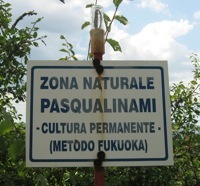- NY Botanical Garden launches summer Edible Garden celebration.
- Thingy for getting more syrup out of maples invented.
- Farmer floods his fields on purpose.
- Insights into tomato late-blight resistance. Do try and keep up!
- A very English guerrilla gardener.
- Pictures of weird fruits and vegetables.
- Russian starters. Uhm, I spot a trend.
- The future of aquaculture: giant robotic roaming cages.
- Saving California’s Sebastopol Gravenstein apple.
- “Zeytinburnu Medicinal Plant Garden, opened in 2005, is Turkey’s first and only medicinal plant garden.”
- Something else has it in for bees: Chinese hornets.
Bolivians going back to their roots
I blogged a couple years ago about what might be called the “1491 controversy,” which hinges on whether you think the Amazon and adjacent areas were densely populated and closely managed before Columbus arrived, or an unproductive, largely pristine wilderness. One of the areas in question is the basin of the Beni River in Bolivia. Whatever your stand on the 1491 debate, it is undeniable that the Beni is a heavily modified landscape.
Shallow floodwaters cover much of the low-lying lands in the Llanos de Moxos during part of the rainy season. The rest of the year, dry conditions prevail and water is scarce. The alternation between seasonal flooding and seasonal drought, combined with poor soil conditions and lack of drainage, make farming in these areas difficult. The ancient inhabitants of the area created an agricultural landscape to solve these problems and make the area highly productive. They constructed a system of raised fields, or large planting surfaces of earth elevated above the seasonally flooded savannas and wetlands. Experiments have shown that the raised fields improve soil conditions and provide localized drainage and the means for water management, nutrient production, and organic recycling.
Well, Bolivian researchers are now suggesting that farmers return to these “camellones,” or raised fields, to harness the seasonal flooding, rather than succumbing to its depredatioons. Oxfam is supporting the project. The BBC was there.
If, as predicted by many experts, the cycles of El Niño/La Niña are going to increase in intensity and frequency, then the project has the capacity to help poor families cope better with the extreme weather events and unpredictable rainfall that are to come.
It would also allow them to cut down on fertilizers, and dabble in aquaculture. There is some scepticism, which has to do with the necessary investment in time and effort. But early results show gains in productivity, apparently, although it’s unclear from the BBC article what exactly is being compared. Anyway, there is much optimism.
This process could be repeated in various parts of the world with similar conditions to the Beni like parts of Bangladesh, India and China.
In the words of local farmer Maira Salas: “We are only just now learning how our ancestors lived and survived.” Well, yes, but with a difference. Some of the crops that are been grown in the camellones are exotic, which is fine, of course. But will there also be a revival of neglected traditional indigenous crops?
Mystery of the undead Fukuoka
 File this one under spooky. Yesterday, walking in the Italian countryside, I spotted an unusual sign. It says, in effect, Permaculture, Fukuoka Method. How many people passing that sign would have the faintest idea what it meant? My companion had no idea who had put it up, or why. I told him briefly about Fukuoka, and he said he’d ask around among his neighbours and see what he could discover. And I took a close look at the hedge in which the sign was planted, and I couldn’t really see anything too unusual about it. A couple of apples, possibly not wildlings, brambles, rose-hips.
File this one under spooky. Yesterday, walking in the Italian countryside, I spotted an unusual sign. It says, in effect, Permaculture, Fukuoka Method. How many people passing that sign would have the faintest idea what it meant? My companion had no idea who had put it up, or why. I told him briefly about Fukuoka, and he said he’d ask around among his neighbours and see what he could discover. And I took a close look at the hedge in which the sign was planted, and I couldn’t really see anything too unusual about it. A couple of apples, possibly not wildlings, brambles, rose-hips.
The spooky part? Exactly one year ago today, we noted the death of Masanobu Fukuoka, who died a year before I snapped that sign.
Was it really a permaculture hedge? And is this something general in Italy, posting signs of this nature? Maybe someone could enlighten me.
Nibbles: Peaches, Education, Water, Food safety
- Shades of gray — local is good — in the organic vs conventional sterility. Yay!
- Lawyers wannabe farmers. They’ll need this font.
- Bartenders wannabe farmers too.
- Well 2.0 — mobile phones to control irrigation.
- Mango seeds source of biocides.
Rainbow sweetcorn not so sweet
Patrick at Bifurcated Carrots reports on his experiment this year growing Painted Hills sweetcorn. to summarise, the plants weren’t very robust, the yield was poor, and the kernels weren’t all that sweet. (Perhaps he should try Red Miracle next year.) On the plus side:
Wow! Multi-colored sweet corn! Can you believe it? A variation of the famous Painted Mountain corn! Perfectly edible. Truly a visual delight, if not a tasty one.
Pat admits that it needs more work to thrive under his conditions, and that he’s not about to take that on, which is fair enough. Maybe someone else will rise to the challenge.
